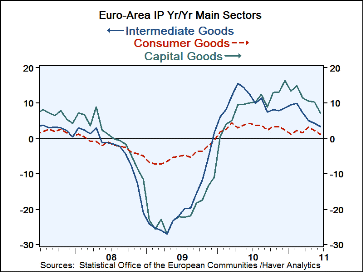 Global| Aug 12 2011
Global| Aug 12 2011Euro-Area IP Takes a Hit
Summary
There is no complicated story here nor any real caveats. The Yr/Yr EMU IP aggregates by sector are slowing: intermediate goods, consumer goods, capital goods. In the just completed Q2 period (Q-2-Date, in the table) Euro-Area IP has [...]
 There is no complicated story here nor any real caveats. The Yr/Yr EMU IP aggregates by sector are slowing:
intermediate goods, consumer goods, capital goods. In the just completed Q2 period (Q-2-Date, in the table)
Euro-Area IP has advanced at a 0.2% annualized rate over Q1 for MFG.
There is no complicated story here nor any real caveats. The Yr/Yr EMU IP aggregates by sector are slowing:
intermediate goods, consumer goods, capital goods. In the just completed Q2 period (Q-2-Date, in the table)
Euro-Area IP has advanced at a 0.2% annualized rate over Q1 for MFG.
This Q2 result is skewed heavily to the upside by Germany where MFG IP surged at an 8% rate in Q2. Italy was next strongest at +5.2%. All the other countries in the table posted IP declines in Q2 compared to Q1. The Euro-Area remains in a policy-befuddling bifurcation.
The UK, an EU not an EMU, member is a country with an austerity plan in place as though it were an EMU member. It saw its IP drop at a 2.1% pace in Q2. Italy was not in trouble for most of Q2; it is only recently on the challenged economy list. But Spain, Ireland Greece and Portugal are on that list; they saw their IP drop respectively at annualized rates of 11.9%. 0.5%, 24.2% and 6.2%.
All countries except Ireland show their sequential growth rates in IP (12-mo to 6-mo to 3-mo) decelerating steadily. So Germany, while posting a better than expected quarter, hit the luck of the draw in terms of its timing. Its IP trend is still in the clutches of a slowdown like the rest of Europe.
Europe is under pressure. Today several more GDP reports were issued. France registered flat for GDP in Q2; Greece registered a sharp drop. Over the past two days we have declines in GDP for Singapore and Hong Kong two economies very plugged into world trade.
Europe has been very much riding the tide of world trade expansion largely on the back of the German export machine. As world growth slows there will be knock-on effect for Europe. We are seeing those effects in train now. Meanwhile Europe is still grappling with its debt problems. In retrospect we have not had a real economic recovery, it may have looked like it but we simply skated through the eye of the storm.
Too many countries in Europe turned too soon to try and restore fiscal balance and now they are paying the price for what we could call the folly of premature conservatism. There is a time for everything. But fiscal contraction during an incipient recovery is now – or should now be- a discredited economic policy. You do not need to believe in Keynesian polices to see this, just believe in reality. Too much government spending in the expansion phase is a bad thing. But fiscal consolidation too early in the recovery period is another mistake. They are not offsetting mistakes, but rather compounding.
Are we too late to recover and to get it right? Maybe not in economic terms but this sort of policy tilt will/would require a political consensus and Europe does not seem about to go there. For that reason I see it as being in real trouble Europe has a troubled business cycle and intractable debt issues with deteriorating credit quality in train to accompany weaker growth. It’s a bad mixture.
I thought we had discredited the ‘Laffer Curve’ years ago in the US. But the Europeans thought they could ride the tide fiscal austerity to a leaner and strong economy even in the short terms. The Laffer Curve they seemed to think would work for them if not in terms of generating more tax revenue, but in terms of getting more growth. That has proved to be folly. Now England now has riots to show for it and there rest of Europe has credit market attacks. And Emu seemingly ash nowhere to turn with Germany giving the cold shoulder to providing more help.
11
11
11
11
11
11
11
11
11
2:D
11
11
11
11
11
11
Only
11
11
11
2:D
Robert Brusca
AuthorMore in Author Profile »Robert A. Brusca is Chief Economist of Fact and Opinion Economics, a consulting firm he founded in Manhattan. He has been an economist on Wall Street for over 25 years. He has visited central banking and large institutional clients in over 30 countries in his career as an economist. Mr. Brusca was a Divisional Research Chief at the Federal Reserve Bank of NY (Chief of the International Financial markets Division), a Fed Watcher at Irving Trust and Chief Economist at Nikko Securities International. He is widely quoted and appears in various media. Mr. Brusca holds an MA and Ph.D. in economics from Michigan State University and a BA in Economics from the University of Michigan. His research pursues his strong interests in non aligned policy economics as well as international economics. FAO Economics’ research targets investors to assist them in making better investment decisions in stocks, bonds and in a variety of international assets. The company does not manage money and has no conflicts in giving economic advice.
More Economy in Brief
 Global| Feb 05 2026
Global| Feb 05 2026Charts of the Week: Balanced Policy, Resilient Data and AI Narratives
by:Andrew Cates






